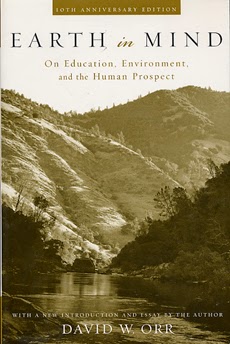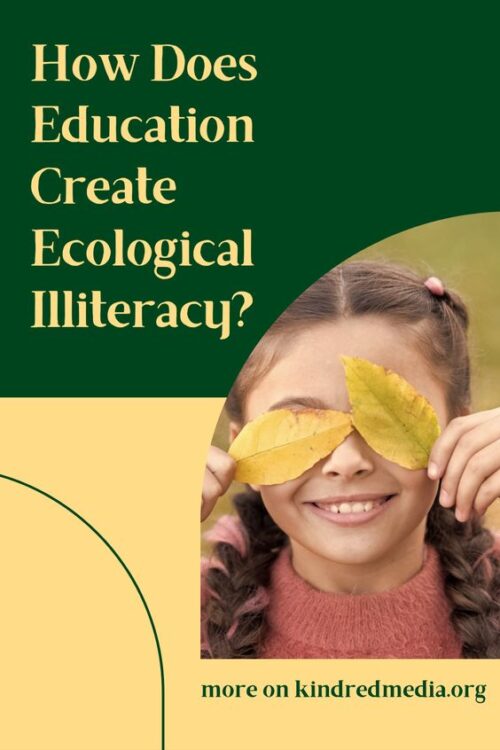Education has not changed in the ways needed today.
In his book, Earth in Mind: On Education, Environment, and the Human Prospect, David Orr pointed out that the type of aptitudes and attitudes that were needed to industrialize the Earth are not the same as those needed to heal planetary ecology and build durable economies and communities. What he pointed out a few decades ago, unfortunately, is still true today: “We are still educating the young as if there were no planetary emergency” (Orr, 1994, p. 27).
Instead of rewarding the kinds of intelligence we need, education systems and society at large continue to reward cleverness (short term manipulative thinking and action, as opposed to intelligence: long term holistic thinking and action aimed at thriving) as well as conformity, “indoor thinking,” and careerism. Universities continue to be factories of fragmented unevaluated knowledge that is directed more by the worlds of power and commerce (as advocated by Francis Bacon, a founding father of our current worldview) rather than by wisdom. The industrial economy desires college graduates with enough scientific and mechanical knowhow to keep industry profitable, but no more, since a more holistic education might rock the boat, questioning the whole industrial lifeway.
The Western worldview’s other founding fathers, Galileo and Descartes, were more like engineers than scientists, focused on measurement—quantification and accounting—outside of value or the principles of an ecologically responsible life.
“Feelings and intuition were tossed out, as were those fuzzy, qualitative parts of reality, such as aesthetic appreciation, loyalty, friendship, sentiment, empathy, and charity” (Orr, p. 31).
Although modern science largely rejects passion and personality, these implicitly drive most every scientist, infusing every research design, method, and interpretation. We need broader, more consciously self-aware conceptions of science and rationality, conceptions that are inclusive of personal knowledge, a connoisseurship of understanding that is embodied and holistic (Polanyi, 1958). Michael Polanyi wrote:
“Objectivism has totally falsified our conception of truth, by exalting what we can know and prove, while covering up with ambiguous utterances all that we know and cannot prove, even though the latter knowledge underlies, and must ultimately set its seal to, all that we can prove” (Polanyi, 1958, p. 286).
“Technological fundamentalism,” mindless and uncontrollable technological “progress,” that surpasses natural limits, subverting biosystems of the planet, needs to be challenged. Thomas Berry (2006) discussed how we are entranced with the possibility of a WonderWorld through our technologies. Yet what we are really creating, if you are paying attention, is a WasteWorld. The latter realization requires an evaluation of the industrialized, technological world. Because of its destructiveness, the industrial world is a one-time event.
So how do we rework education so that it actually grows the intelligence needed to address the crises we face?
Today we require “first-hand knowledge” (that which connects and mind) and “material creative activity” (Alfred North Whitehead, 1967, p. 51), especially in relation to responsible ecological life. It’s a matter of learning wholeness in response to an Earth full of living intelligence.
“We will have to challenge the hubris buried in the hidden curriculum that says that human domination of nature is good; that the growth of economy is natural; that all knowledge, regardless of its consequences, is equally valuable; and that material progress is our right. As a result, we suffer a kind of cultural immune deficiency anemia that renders us unable to resist the seductions of technology, convenience, and short-term gain. In this perspective, the ecological crisis is a test of our loyalties and of our deeper affinities for life” (Orr, 1994, p. 32)
What does the needed intelligence look like?
It exhibits forebearance, a sense of limits. It does not assume that one can “first set demons at large, and then, somehow become smart enough to control them” (W. Berry, 1983, p. 65). It does not violate the boundaries of morality.
“It does not, in the name of some alleged higher good, demand the violation of life, community, or decency. Intelligent behavior is consonant with moderation, loyalty, justice, compassion, and truthfulness, not for ethereal theological reasons but because these are fundamental to living well. Morality is long term practicality that recognizes our limits, fallibility, and ignorance” (Orr, 1994, p. 50).
Real intelligence is not only intellectual horsepower but also a matter of moral character.
How do educators foster such intelligence?
Educators need to discuss their motivations for their work, the feelings they have regarding their professions. These personal stories will provide a scaffolding for students to discern their own callings and a wise choosing of pathways forward in their lives.
Citizenship attitudes and skills need to be part of the curriculum with a focus on the wider collective community—planetary wellbeing.
“To abuse natural resources, to erode soils, to destroy natural diversity, to waste, to take more than one’s fair share, to fail to replenish what has been used must someday come to be regarded as unpatriotic and wrong” (Orr, 1994, p. 32).
This requires the ability to perceive, which most humans had until recent centuries, that “the university is a communion of subjects, not a collection of objects” (T. Berry, 2006, p. 17).
Mindsets are derived from language, models, and theories, so these must be selected carefully by educators. To discuss the natural world as “sustainable yields” or “board feet” or “barrels” emphasizes objectification of the Earth as full of objects or resources rather than living beings. To emphasize human needs over the needs of the rest of the planet, to emphasize only human welfare instead of local ecological welfare is to disserve the students and their communities.
Educators must help students understand and develop biophilia, the love of living things. “The thousandfold voices of the natural world became inaudible to many humans. The mountains, rivers, wind, and sea all became mute insofar as humans were concerned” (T. Berry, 2006, p. 18). As individuals recover these sensibilities, “a new interior experience awakens within the human…the barriers disappear…an enlargement of soul takes place…the excitement evoked by natural phenomena is renewed…dawn and sunset are once again transforming experiences, as are the sights, sounds, scents, tastes, and feel of the natural world about us—the surging sea, the sound of the wind, the brooding forest” (ibid).
Can educators foster the needed intelligence in their students? Certainly, the first thing is to help students avoid acting stupidly (in the manners described earlier). Bringing in intelligent people (as described earlier) who don’t have the academic credentials but practical ones as mentors to students will demonstrate what intelligence looks like in the real world.
Finally, Orr suggests that educators “attempt to teach the things that one might imagine the earth would teach us: silence, humility, holiness, connectedness, courtesy, beauty, celebration, giving, restoration, obligation, and wildness” (Orr, 1994, p. 52).
Notably, in an era of lots of homeschooling, every family can do this too.
References
Berry, T. (1999). The great work: Our way into the future. New York, NY: Three Rivers Press.
Berry, W. (1983). Standing by words. San Francisco: North Point Press.
Orr, D. (1994). Earth in Mind: On Education, Environment, and the Human Prospect. Washington, D.C.: Island Press.
Polanyi, M. (1958). Personal Knowledge: Towards a post-critical philosophy. Chicago: University of Chicago Press.
Whitehead, A.N. (1967). The aims of education. New York: Basic Books.



